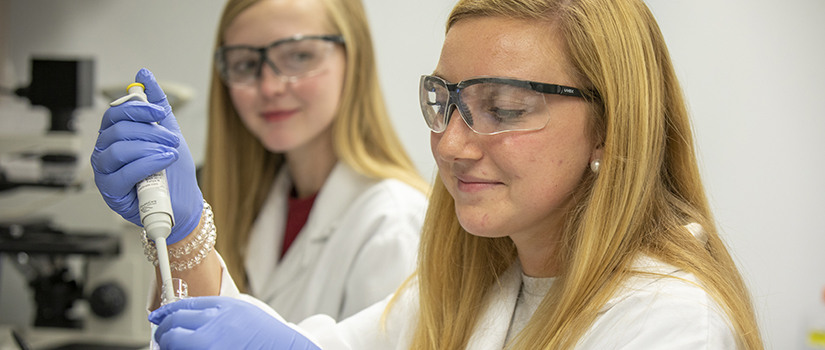Curriculum
The biomedical engineering bachelor's program will provide you with a thorough grounding in engineering, mathematics, chemistry, physics and biology. Our curriculum provides a strong foundation in the basic and applied sciences, as well as in the liberal arts, to provide you with a well-balanced education. You will learn the application of mathematics and science at the interface between engineering and biology. Ultimately, we strive to prepare you for graduate studies in biomedical engineering, professional studies in medical school, or professional careers in biomedical engineering industries.
Major courses in biomedical engineering include:
- Introduction to Biomechanics
- Introduction to Biomaterials
- Thermodynamics of Biomolecular Systems
- Biomonitoring and Electrophysiology
- Human Anatomy and Physiology for Biomedical Engineers
- Biotransport
- Biomedical Instrumentation
- Kinetics in Biomolecular Systems
- Biomedical Engineering Laboratory
- Senior Biomedical Engineering Design
The curriculum also includes the Carolina Core, foundational math and science courses, and technical and engineering electives. Independent study and special topics courses also provide unique learning opportunities.
Visit Undergraduate Curricula and Courses for additional details.
Tracks
You may choose to be a biomedical engineering generalist, or you may choose to focus your electives and design experiences on a medical, biomechanics, or biomolecular track.
Our medical track is designed so that you can complete the requirements for medical school admission and at the same time receive an engineering education. You will learn about the anatomy and physiology of the human body and its systems with an engineering perspective. There may be an easier way to become a physician or health professional, but the critical thinking and problem solving skills you develop as an engineer can make you a better doctor.
Our biomechanics track provides you with expertise to apply principles from engineering mechanics to the study of living systems. It includes, amongst other fields, the study of material properties, biofluid mechanics in the cardiovascular and respiratory systems, heat and mass transfer into biological tissues, as well as statics and dynamics of human movement, and interactions of medical implants with the human body.
Our biomolecular track combines biology and engineering concepts to model and predict biomolecular interactions that will lead to the design of new therapeutic agents and new platforms for delivery of these therapies. In our program, you will learn how to apply engineering principles such as transport, thermodynamics, kinetics, and computational modeling to biomolecular systems to prepare you for a career working in the design, development, and manufacture of new drug technologies.
Capstone Design
As an undergraduate student, you'll test your knowledge in real-world applications. Our Capstone Design experience is a two-semester course sequence for seniors that pairs a student team with an industry partner on a project to design an engineering solution to a biomedical problem. Examples of recent biomedical engineering capstone design projects include:
- A Functional Prosthetic Arm for Children with Transhumeral Amputations
- A Uniaxial Tissue Stretching Device for Multiphoton Microscopy and Digital Image Correlation
- Development of High Shear Homogenization Parameters for Bulk Budesonide Inhalation Suspension
- Development of Rule-Based Recognition Systems for Continuous Monitorization of Pulse Oximetry
- Molecular Model of Macrophage Membrane Fusion
- Optimization of Microfluidic Chip Fabrication via Femtosecond Laser Ablation
Extracurriculars
Biomedical Engineering students participate in a variety of clubs including our student chapters of:
- Hands on Prosthetic Engineering (HOPE)
- Biomedical Engineering Society (BMES)
- Alpha Eta Mu Beta, Biomedical Engineering Honor Society
Undergraduate research opportunities in the areas of biomechanics, tissue engineering, drug delivery, biomonitoring, and biomaterials are available on a volunteer, course credit, or paid position basis. With other undergraduates, biomedical engineering students take full advantage of living-learning communities, mentorship opportunities, study abroad, intramurals, internships, just hanging out with friends, and more.
